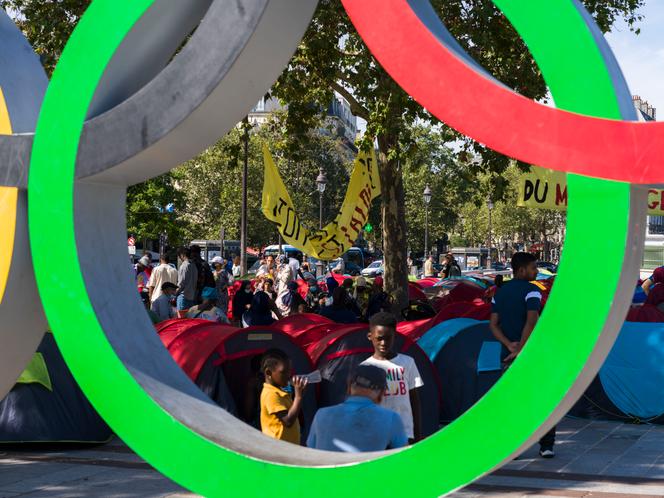


A few minutes' walk from the temporary Parc des Nations, the emblematic venue for the Olympic Games celebrations, a line that was anything but temporary stretched out along Avenue de la Porte de La Villette, in the 19th arrondissement of Paris. Several hundred people in extremely vulnerable situations were waiting for a hot meal on Wednesday, August 7.
"Look at us, look how beautiful and clean France is," said Issam (a pseudonym, as with most of the people quoted). "There's the France of the Olympics, the France of the tourists, and then all around, there's what people prefer not to see – people like me, for whom nothing changes." Or almost nothing: In the year he's been living on the streets, evicted from a hostel, this 46-year-old man from Algeria has never experienced so many police checks. "Paris is celebrating, but I feel even more watched from above, even more of a nuisance with my backpack. I'm the one people are afraid of," he said.
The large refectory where the La Chorba aid organization serves meals was packed. By late afternoon, a line had formed along the length of the building, which adjoins the Glazart concert hall. Most were men, predominantly undocumented and homeless. Pauline Duhault, one of the organization's managers, hasn't noticed any drop in numbers since the start of the Olympic Games. "We're still serving 700 to 800 meals per shift," she said, "but we're seeing a lot of new people, and far fewer unaccompanied minors."
Once the trays have been put down, dinner ends with a cup of tea or coffee outside. In the queue, Sadiq, 37, originally from Algeria, spends the night in a tent in Antony, south of Paris, and works "informally from time to time in the building trade." He, too, has noticed an increase in police checks since the start of the Games: "I have no papers, but the police let me go." The same goes for Walid, 46, a Tunisian with an open plaid shirt over a T-shirt bearing the title of the Stranger Things series, who works the markets "under the table" and sleeps in the street at Porte de Clignancourt.
Akram, 40, who is "legally documented" but has been homeless since separating from his wife last year, sleeps near the Gare de Lyon in central Paris or in a park. He is about to start training as a forklift driver. He hasn't been particularly harassed by law enforcement either. This hidden poverty, far from the Olympic venues and the capital's tourist areas, was not a priority for the Paris Police Prefecture, as long as it remains under the radar.
You have 80.51% of this article left to read. The rest is for subscribers only.
